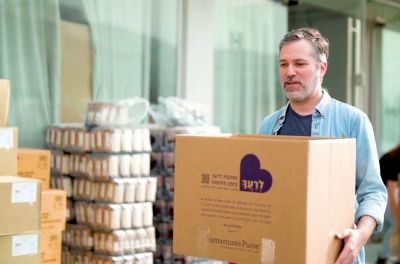More Israelis requesting copies of the New Testament after Oct. 7, Messianic Jewish group says

The faith-based nonprofit Jews for Jesus, an organization that shares the Gospel with people of the Jewish faith, says it has seen an increase in the number of New Testament orders from Israelis since the war between Israel and Hamas began last October.
Jews for Jesus, affiliated with the Messianic Jewish movement, is an organization dedicated to helping Jewish people continue living out their faith while believing in Christ, the Son of God.
According to the nonprofit's website, Jews for Jesus' international headquarters is located in San Francisco, but the group has various branch offices in cities worldwide, including New York, London, Tel Aviv and Jerusalem.
The organization engages in conversations about Jesus in public spaces like college campuses and parks and hosts events to create opportunities for dialogue. The group is devoted to demonstrating Christ-like behavior through charitable acts, such as soup kitchens and ministering to Holocaust survivors during their last days of life.
Jews for Jesus offers the New Testament for free to Israelis through its website and the sites of its ministry partners, One for Israel or Tree of Life Ministries. According to data provided to The Christian Post, the organization has seen 1,230 New Testament orders from Israelis since the war between Israel and the terror group Hamas began in October.
Israel launched a military operation to eradicate Hamas after the terror group killed around 1,200 people and abducted over 240 others during a surprise attack on Oct. 7. The Hamas-run Gaza Health Ministry claims over 37,000 people have been killed in Gaza since the war began but has not differentiated between combatants and civilians.
Jews for Jesus Executive Director Aaron Abramson told CP that one possible reason for the increase in requests is that Israelis appear to have a lot of questions, including spiritual ones, since Hamas' Oct. 7 onslaught

"But there's also a kind of hopelessness," Abramson said. "Israel has prided itself in its ability to defend itself, so Oct. 7 was a real blow to that for people. You had people questioning whether they should remain in Israel and if it was safe for them. You have people who once lived in other countries and experienced antisemitism who were like, 'Well, where do we go from here?'"
"And so, if you can't put your trust in maybe, let's say, a political solution, you can't put your trust in like a military solution, or if you can't put your trust in an economic solution, then where do you put your trust?" he asked. "And I think that's why a lot of people were starting to sort of dig into those spiritual questions."
Abramson said that many of the organization's staff in Israel have wives, husbands or kids in the Israeli military who were called in after Oct. 7. He said the nonprofit decided to "shift gears" by supporting those who were impacted by the terrorist attack, partnering with groups like Samaritan's Purse to help those in need.
In addition to helping kibbutzim residents relocate after Hamas devastated their communities, Jews for Jesus helped provide food once residents resettled at hotels. The nonprofit also helped set up makeshift classrooms so the children of the kibbutzim communities could continue going to school.
Jews for Jesus transformed its Moishe Roshen Center in Tel Aviv into a location that provided resources to those impacted by Oct. 7, such as toiletries and medication. Abramson said that the group even set up an art gallery to help people express themselves and hosted barbeques for military units.

"So for us, it was really how can we create space for people to come in to wrestle through deeper questions and how can we speak to those spiritual needs, as well as meeting some of those emotional and physical needs?" Abramson said.
A nonprofit organization dedicated to teaching Jews about Jesus is not without controversy, however.
The nonprofit CEO said the group has received some pushback from some Orthodox communities who are opposed to Jews for Jesus' missionary work.
In the past, he said the organization has attempted to conduct outreach in Jerusalem, and a whole yeshiva of around 20 or 30 guys have come out to stop them. A yeshiva is a traditional Jewish education institution that usually includes the study of writings like the Talmud.
"I'm not trying to make the claim that Judaism is about following Jesus," Abramson clarified. "I realize that the majority of the different branches of Judaism would disagree that Jesus is the Messiah."
"But that doesn't change the fact that there are a significant amount of Jews in Israel and abroad, in the United States and other places that have found meaning, life and hope in Jesus as their Jewish Messiah," he added.
When it comes to sharing the Gospel with Jews, Abramson said there is not a "one-size fits all approach," highlighting the variety of Jewish communities who believe different things.
For example, a secular Jew may have questions about the existence of God and the conversation may take a different turn compared to a discussion with an Orthodox Jew.
"So, I think there are a few things that I encourage people to do," Abramson said. "One, don't be afraid. Jewish people are like everybody else in that you can talk and bring stuff up."
"And, you know, I wouldn't say just ignore the social cues you're getting," the CEO continued. "You know, try and get an idea. Does it seem like they want to interact around it? You can always toss a seed out there. Even the smallest little thing."
"There are moments when God may inspire you just to be bold and to say, 'Hey, I just want to tell you, I don't know if you've ever considered this,' ... and people will come to faith that way."
Samantha Kamman is a reporter for The Christian Post. She can be reached at: samantha.kamman@christianpost.com. Follow her on Twitter: @Samantha_Kamman




























